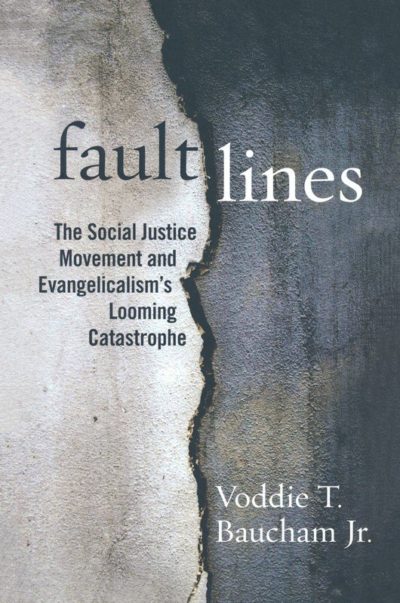Reviewed by Pastor Brad Rogers
Born and raised during desegregation in South Central Los Angeles, Voddie Baucham was bussed across town from his black neighborhood to an all-white school in the Los Angeles Unified School District. He writes, “I grew up poor, without a father, and surrounded by drugs, gangs, violence, and dysfunction in one of the toughest urban environments imaginable.” Yet, through the extravagant grace of God and the prayers and wisdom of his mother, God found Baucham in 1987 through a Campus Crusade for Christ leader at New Mexico State University. This encounter with God’s grace changed everything. He sensed a call to ministry, was ordained, and has had a distinguished pastoral career. Today, Baucham, his wife, and nine kids serve as missionaries in Zambia. The geographic distance from the States has enabled him to think and speak with clarity about the clashing worldviews that are shaking American culture.

In his book, Fault Lines: The Social Justice Movement and Evangelicalism’s Looming Catastrophe, Baucham unearths the “faults and fractures” which have been developing subterraneously in the evangelical church. The seismic, cultural changes that have taken hold in America over the last several decades have caused the foundations of many evangelical Christian churches and seminaries to crack and crumble under a facade of social justice. Baucham evidences this reality by writing: “Relationships are being ruined, reputations are being tarnished, careers are being destroyed, and entire denominations are in danger of being derailed.” His conviction is that the core of the issue is not growing ethnic tensions, though he does not discount that those tensions may be growing. He further suggests that the issue is not politics, despite the polarization of the political arena. Rather, Baucham writes that the core of the issue is the distinction between social justice and biblical justice, and “a lack of clarity and charity in our debate over the place, priority, practice, and definition of justice.” In other words, the tremors that the evangelical church is feeling are caused by two clashing worldviews: a critical social justice worldview and a biblical worldview.
Throughout the book, Baucham persuasively articulates that the social justice movement tends to create false dichotomies that oversimplify complex social realities. Further, social justice advocates tend to shut down dissenting perspectives—including those of black Christians like Baucham—by suggesting that these perspectives stand against justice. Who would want to do that? Central to his analysis is the conviction that Critical Race Theory, as part of a broader category of thought he refers to as Critical Social Justice, is not merely an analytical tool to understand culture but a worldview antithetical to a biblical worldview. This worldview, along with the redefinition of terms such as racism, has created an environment where dialogue has become perilous. To be successful in this new environment, Christians must under-stand the terrain by knowing where the fault lines lie. While Baucham’s nuanced perspective is at times overstated, Fault Lines is nonetheless a helpful guide for grasping Critical Race Theory, the worldview upon which it is built, and how it is distinct from biblical justice.
For those who long for the justice that God will bring to creation when Christ judges the living and the dead and who seek God’s will to be done on earth as it is in heaven, this book is helpful in dismantling the false dichotomies of the critical social justice movement. It also provides a thought-provoking analysis of numerous stories that have dominated the media for the last couple of years. It is a refreshing perspective from a black Christian regarding conversations about race that are taking place across the world today—and takes seriously both justice and the problems inherent to Critical Race Theory.





